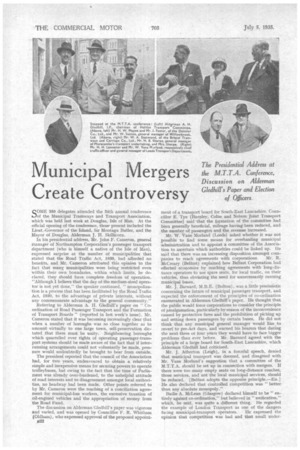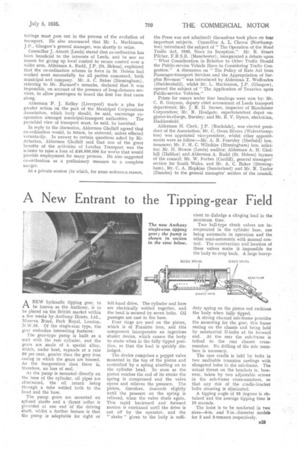Municipal Mergers Create Controversy
Page 32

Page 33

If you've noticed an error in this article please click here to report it so we can fix it.
The Presidential Address at the M.T.T.A. Conference, Discussion on Alderman Gledhill's Paper and Election of Officers
SOME 350 delegates attended the 34th annual conference of the Municipal Tramways and Transport Association, which was held last week at Douglas, Isle of Man. At the official opening of the conference, those present included the Lieut.-Governor of the Island, Sir Montagu Butler, and the Mayor of Douglas, Alderman J. H. Skillicorn.
In his presidential address, Mr. John F. Cameron, general manager of Northampton Corporation's passenger transport department who is himself a native of the Isle of Man), expressed surprise at the number of municipalities that stated that the Road Traffic Act, 1930, had afforded no benefits, and Mr. Cameron attributed this opinion to the fact that many. municipalities were being restricted even within their own boundaries, within which limits, he declared, they should have complete freedom of operation. "Although I believe that the day of the medium-sized operator is not yet done," the speaker continued, " monopolization is a process that has been facilitated by the Road Traffic Act, 1930, to the advantage of private interests, without any commensurate advantage to the general community."
Referring to Alderman A. II. Gledhill's paper on " Coordination of Road Passenger Transport and the Formation of Transport Boards " (reported in last week's issue), Mr. Cameron stated that it was becoming increasingly clear that when a number of boroughs was so close together as to amount virtually to one large town, self-preservation dictated that there must be unity. Neighbouring boroughs which quarrelled over rights of operating passenger-transport systems should be made aware of the fact that if interrunning arrangements could not voluntarily be made, pressure would undoubtedly be brought to bear from outside. The president: reported that the council of the Association had, for two years, endeavoured to obtain a relatively simple and inexpensive means for securing powers to operate trolleybuses, but owing to the fact that the time of Parliament was already over-burdened, to the unhelpful attitude of road interests and to disagreement amongst local authorities, no headway had been made. Other points referred to by Mr. Cameron were the reaching of a conciliation agreement for municipal-bus workers, the excessive taxation of oil-engined vehicles and the appropriation of money from the Road Fund.
The discussion on Alderman Gledhill's paper was vigorous and varied, and was opened by Councillor F. R. Whitham .(Oldham), who expressed approval of the proposed appoint
B22 ment of a transport board for South-East Lancashire. Councillor E. Tye (Burnley, Colne and Nelson Joint Transport Committee) said that the formation of the committee had been generally beneficial, mileage having been reduced, and the number of passengers and the revenue increased. Mr. W. Vane Morland (Leeds) asked whether it was not possible to find some means for overhauling municipal administration and to appoint a committee of the Association to ascertain which authorities could he linked up. He said that there was an increasing disposition amongst com panies to reach agreements with corporations. Mr. R. McCreary (Belfast) explained how Belfast Corporation had effected economies by reaching agreements with long-distance operators to use spare seats, for local traffic, on their vehicles, thus obviating the need for unnecessarily running municipal buses. Mr. J. Barnard, M.B.E. (Bolton), was a little pessimistic concerning the future of municipal passenger transport, and expected the enforcement of the principles of co-ordination enumerated in Alderman Gledhill's paper. He thought that the public would force corporations to consider the principle of amalgamation, particularly by reason of the inconvenience caused by protective fares and the prohibition of picking up and setting down passengers by certain buses, He did not think that any municipal general manager would like to revert: to pm-Act days, and warned his hearers that during the next three or four years they would have to face bigger problems than ever before. Mr. Barnard agreed with the principle of a large board for South-East Lancashire, which Alderman Gledhill had criticized.
Mr. J. Atherton (Leigh), in a forceful speech, denied that municipal transport was doomed, and disagreed with Mr. Vane Morland's suggestion that a committee of the M.T.T.A.. should be set up in. connection with mergers. If there were too many empty seats on long-distance coaches, those services, and not the local municipal services, should be reduced. [Belfast adopts the opposite principle—ED.1 He also declared that controlled competition was " better than any absolute monopoly." Bailie A. McLean (Glasgow) declared himself to be " entirely against co-ordination," but believed in "unification," which, he said, was quite a different thing. He regarded the example of London Transport as one of the dangers facing municipal-transport operators. He expressed the opinion that competition was bad and that small under takings must pass out in the process of the evolution of transport. He also announced that Mr. L. Mackinnon, J.P., Glasgow's general manager, was shortly to retire.
Councillor j. Amott (Leeds) stated that co-ordination has been beneficial to the interests of Leeds, and he saw no reason for giving up local control to secure control over a wider area. Alderman A. Rudd, J.P. (St. Helens), explained that the co-ordination scheme in force in St. Helens had worked most successfully for all parties concerned, both municipal and company. Mr. A. C. Baker (Birmingham), referring to Mr. Barnard's remarks, declared that it was impossible, on account of the presence of long-distance services, to allow passengers to board the first bus that came along.
Alderman P. J. Kelley (Liverpool) made a plea for greater action on the part of the Municipal Corporations Association, which body should, he said, encourage co operation amongst municipal-transport authorities, The parochial view of transport must, he said, be banished.
In reply to the discussion, Alderman Gledhill agreed that co-ordination would, in future, be enforced, unless effected voluntarily. In answer to certain questions asked by Mr. Atherton, Alderman Gledhill said that one of the great benefits of the activities of London Transport was the scheme to raise a loan of £40,000,000 for works that would provide employment for many persons. He also suggested co-ordination as a preliminary measure to a complete merger.
At a private session (to which, for some unknown reason,
the Press was not admitted). discussions took place orr four important subjects. Councillor A. L. Chown (Northampton) introduced the subject of "The Operation of the Road Traffic Act, 1930, Since its Inception." Mr. R. Stuart Pilcher, F.R.S.E. (Manchester), inaugurated a debate upon " What Consideration in Relation to Other Traffic Should the Public-service Vehicle Have in Considering Traffic Congestion." A. discussion on The Policy of Rate Aid from Passenger-transport Services and the Appropriation of Surplus Revenue" was introduced by Alderman T. Woffenden (Huddersfield), whilst Mr. L. Mackinnon, J.P. (Glasgow). opened the subject of "The Application of Taxation upon Public-service Vehicles."
Prizes for essays under four headings were won by: Mr.
• C. E. Grayson, deputy chief accountant of Leeds transport department; Mr. J. R. H. Barnes, inspector of Manchester Corporation; Mr. R. Houlgate, superintendent depot engineer-in-charge, Burnley; and Mr. E. V. Dyson, electrician, Huddersfield.
Alderman H. Clark, J.P. (Rochdale), was elected president of the Association; Mr. C. Owen Silvers (Wolverhampton) was appointed vice-president, whilst other appointments were as follow:—Mr. A. R. Fearnley (Sheffield) hon. treasurer; Mr, F. H. C. Wiltshire (Birmingham) hon. solidtor; Mr. H. Maxon (Leeds) auditor; Alderman A. H. Gledhill (Halifax) and Alderman A. Rudd (St. Helens) laymen of the council; Mr. W. Forbes (Cardiff), general managers' section for South Wales, and Mr. A. C. Baker (Birmingham), Mr. C. A. Hopkins (Sunderland) and Mr. R. Taylor (Dundee) to the general managers' section of the council.




















































































